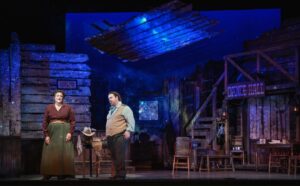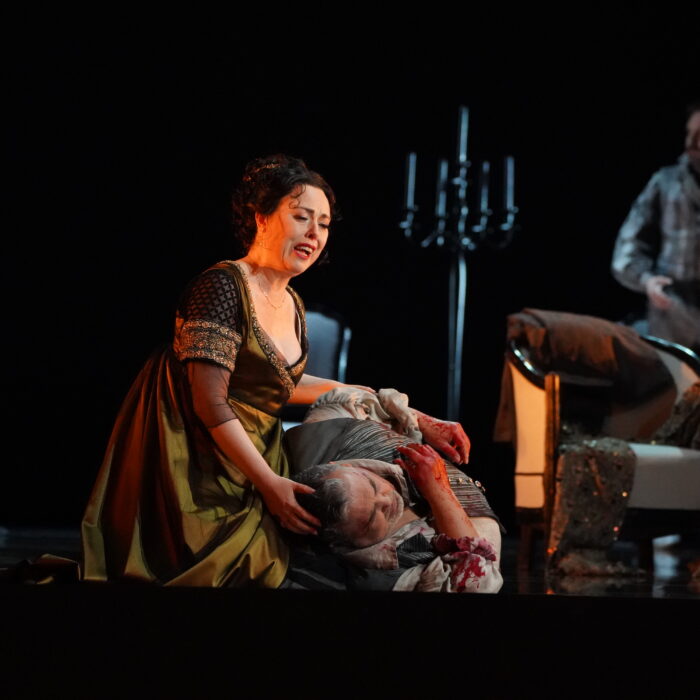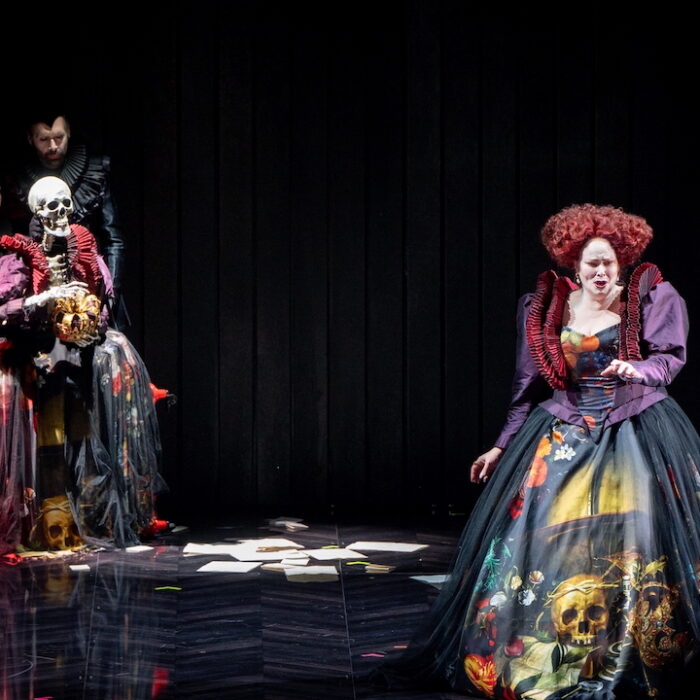
Central City Opera 2024 Review: La Fanciulla del West
Central City Opera Celebrates Puccini’s Centennial with His Western Masterpiece
By Benjamin Torbert(Photo credit: Amanda Tipton)
Central City Opera (CCO) resurges in 2023-24, the institution entering the Colorado Music Hall of Fame, installing Alison Moritz as Artistic Director and bouncing back from a turbulent 2023 marked by labor strife, now buoyed by the new leadership of CEO Scott Finlay. With a reinforced endowment, CCO’s ambitious 2024 summer festival season programmed Gilbert and Sullivan’s “The Pirates of Penzance,” and Kurt Weill’s “Street Scene,” a work with an enormous cast. Nearly as large a human resources lift, Puccini’s “La Fanciulla del West” requires eighteen credited singers, all male but the titular heroine and her house lady Wowkle. The fifth oldest extant American opera company, Central City manages to draw internationally-known singers, easily filling with audience its opera house, an intimate architectural treasure built in 1878.
Other than Douglas Moore’s “The Ballad of Baby Doe,” set in Colorado, and premiered here in 1956, no more appropriate an opera for CCO to produce than “Fanciulla” occupies the standard repertory. Central City, Colorado, though petite, presents as Puccini’s mining camp, grown up. Approaching the opera house from a municipal parking lot, walking three blocks, entering the auditorium, and greeting Act one’s set, the Polka saloon, feels like a far shorter trip than, say, encountering Giancarlo Del Monaco’s massive production, accessed via midcentury’s fountained plaza and red velvet womb at the Metropolitan Opera—just one more nineteenth century setting among many there. Bars equipped with digital gambling machines supply Central City’s main commercial activity; “Fanciulla” stars the only American woman who tends bar in a repertory opera, surrounded by tipplers who gamble their scant earnings from mining for gold. Any house willing to meet the daunting challenge of mounting “Fanciulla” qualifies as a great place to see it, but who can name a better venue for Puccini’s Italian Western than Central City?
Alla Polka si beve l’whisky schietto
“Fanciulla” unfolds with propulsive dramatic momentum far exceeding that of “Madama Butterfly” and rivaling “Tosca.” Unlike the slow-ish first act of “Manon Lescaut,” and maybe even some of the boys’ early horsing around in “La Bohème,” Puccini’s genius for rendering atmospheric slices of life has fully matured in “Fanciulla” and advances the drama unerringly. Few other operas make as many dramatic points reaching them as swiftly; Verdi’s “Rigoletto” might be the exemplar on that count. Every micro-scene, all of them smoothly through-composed, sets up something else later in the opera. For example, Sid’s exile from the gambling table for cheating at cards, as Rance effectively saves his life, prefigures and complicates Minnie’s dishonest but necessary triumph over Rance at Cantredraw in Act two, and, it also gives us an early example of the sort of de-escalation the heroine enacts in the denouement. And Rance, the baritone antagonist, though also a grabby officer of the law, presents the audience with dramatic nuance lost on Baron Scarpia in “Tosca” and he manages not to be a complete rat bastard, unlike the Roman chief of police. Too, instead of forming a dozen-headed ensemble, Puccini individuates the miners brilliantly despite allotting tiny amounts of time to each, often with snappy dialogue. Today’s opera producers have found ways to fix the libretto’s sole weakness, a brief but cringy portrayal of the Native couple, Billy Jackrabbit and Wowkle. That said, “Fanciulla” offers something truly remarkable for a 1910 opera about American characters from 1849: the protagonists are an interracial couple, portrayed positively.
Best of all, unlike every other canonical, noncomic Puccini opera, “Fanciulla” refrains from sacrificing the heroine on an artistic altar before us. It also marks a shift to even richer, denser orchestration than we find in Puccini’s earlier hits, and to adventurous tonality, without overeliance on pentatonic like we hear in “Turandot,”—that opera, despite its virtues, a dramatic cul-de-sac into which Puccini painted himself well prior to his final illness. While we associate complicated use of leitmotif in opera foremost with Wagner, Puccini frequently achieves as much or more with greater motivic economy, as with the redemption theme in “Fanciulla,” growing by degrees from Minnie’s Bible lesson. “Fanciulla” works as opera and it works as film music, only the film takes place in live stage action.
For many of the above reasons, similarly to Wagner’s “Parsifal,” and Verdi’s “Don Carlo,” “Fanciulla” has enjoyed a tendency to attract particularly sincere commitment from the companies attempting it. Though perhaps lucky, I haven’t seen a bad performance of this opera. In 2020, even an outfit as small as Winter Opera Saint Louis—that town’s third company, on a shoestring budget with an orchestra pit housing just 26 instrumentalists—gave a pretty good “Fanciulla” led by Karen Kanakis as Minnie. Though aspects of Central City’s performance this week (31 July 2024) could have been stronger, they rose to the occasion overall, giving a compelling reading of Puccini’s difficult score.
Che terra maledetta, quest’occidente d’oro
Fenlon Lamb’s production played “Fanciulla” straight as a flagpole. No problem there—this opera qualifies as its own staging concept, in a way, and loses little by way of a highly representational realization. Please do something new with “Carmen,” or “Il Barbiere di Siviglia,” but “Fanciulla” can take care of itself. Supertitles have become an integral part of staging, and Brett Finlay took a consistently figurative tack some distance from Italian. Despite CCO’s minuscule backstage space, Jefferson Ridenour’s sets furnished the staging with sufficient detail. Act one’s Polka Saloon implied a back room via a stage left doorway opposite the bar, vertically encircled by a stairwell purposed for platforming Minnie’s hypertheatrical entrance, breaking up the miners’ scuffle with a warning shot in the air. A sign reading “a real home for boys” topped the bar. Her Act two cabin, the usual table, fireplace, bed, and loft, included an item frequently omitted, the bearskin rug she sleeps on, complete with the bear’s head. Unlike the Met’s famous Act three set, which looks like half a town imported whole from Guadix, CCO’s production returned to the forest clearing specified in the libretto, about sixteen tree trunks centerstage with scarcely a gallows stage right, more of a tall wooden accordion fence topped by a wooden hook, slightly past the fourth wall.
Lighting design by Abigail Hoke-Brady, which may have included the uncredited projections, formed the most effective element of the staging. Act one’s love duet took place under a starry night sky inside the saloon. Many companies delay the winter storm until Wowkle references it in the text, but snowy projections backgrounded all of Act two. And simply but elegantly, the romantic dyad in Act one’s duet and Minnie and Rance’s poker game in Act two took well-calibrated spotlights that alluded to the performance of those moments. Sepia-toned photographs of people in the old West, some Native, followed the opening curtain during the short prelude. Best of all, the projections threw onto Minnie’s cabin walls her and Rance’s poker hands, as if we were watching televised pocket cards in Texas Hold’em on ESPN, less ostentatiously than that sounds in print.
Costumes by Susan Allred borrowed from Utah Opera outfitted Jonathan Burton’s Johnson in a double-breasted tan suit early and a bloodstained white shirt for Act three, a là Tosca’s tortured Cavaradossi. Grant Youngblood’s Sheriff Rance received the usual black three-piece suit. Kara Shay Thomson’s Minnie wore a simple burgundy blouse and dark green skirt, until her slumber party in Act two with Johnson, and then a crimson house robe. The miners looked like miners in a Western movie. Though unadventurous, this staging provided some interesting twists. An armed Sonora stood down and disarmed Sheriff Rance during the climactic concertato, sidelining him. Indeed, Rance faced more guns than he pointed. Minnie pulled her pistol on him during their first act duet warning him away. And Sonora refused to place the noose about Johnson’s neck, leaving him to do it himself, which Ashby later reversed during the forgiveness concerto.
Benvenuto fra noi, Johnson di Sacramento
Most impressive of the principals was tenor Jonathan Burton, as the reforming bandit, Dick Johnson/Ramerrez. Not often do we encounter a performance of an opera requiring a tenor of lirico-spinto or dramatic fach, and the tenor sings best. His recent outings cluster on the spinto side, including a slate of the usual suspects in more-performed Puccini operas, and he delivers a baritonal heft. He entered with a sunny swagger, unperturbed when Rance refused his handshake. After a slight vocal warm-up before us, he let Minnie come to him rather than pressing her in the first love duet—interesting, because Minnie’s unverbalized desire to escape the way her male compatriots have boxed her in frequently seems realized in projections of her desires onto Johnson. (“I can’t read my heart like you can”). You understood his appeal to Minnie in “Quello che tacete,” when Burton shot the A♭ in “una gioia strana” through the firmament of the projected stars in the saloon. They embraced before he proposed the date in her cabin—which she told him and the audience is “closer to God” than the saloon. At the cabin his request for “un bacio, un bacio almen” came with Wagnerian power—indeed, a bevy of secure high notes throughout the second act. Beginning “Or son sei mesi” with his back to her, ashamed, Burton really threw himself into “la mia vergogna,” without having to push vocally. The baritonal weight returned in Act three for “Ch’ella mi creda,” one of the few passages in “Fanciulla” that acts like an aria. With such sincerity speaking of Minnie, “per lei,” Burton gave the aria with a prayerful tone—it is in fact a prayer—to the other men. He built the dynamic contrast from piano with the first “mio solo fiore” and constructed a huge build to the high B♭. After initially participating in roughing him up, the other men less Rance had already boarded the forgiveness train, recoiling when the sheriff kept punching him. “Fanciulla” requires a solid tenor, and Burton met the challenge.
Che c’è di nuovo, Jack?
A CCO veteran of more than two decades, and deeply experienced in Puccini, baritone Grant Youngblood made for an interesting Jack Rance. “Fanciulla” shares some odd parallels with “Tosca,” and some of the same men who portray Scarpia, later get a chance to essay the menacing but less-dastardly western Sheriff. Youngblood instead played Rance as gentlemanly for most of the opera, somewhat wearied by it all, and even a little whiny at Minnie’s romantic rejection. He displayed no rage and little grabbiness towards her until the brink of Act two’s poker game, making this shift more impactful than when the baritone takes a handsier path to the soprano throughout. Puccini excelled at setting up dramatic situations where one character must listen to another. Youngblood’s Rance afforded Minnie some active listening as she outlined her philosophy of love in “Laggiu nel Soledad.” His own aria prior, “Minnie, dalla mia casa son partito” emerged with sorrow and a confessional air, rather than the scattershot masculine nonchalance you’ll sometimes see in this role. Stronger low than high vocally but with a refined sound, Youngblood gave the impression he was more lovestruck by Minnie than lustful for her, at least in Act one. This reinforced the dynamic not only between Rance and Minnie’s new boo Johnson, but between the latter and the whole mining camp, Sherriff included: in their eyes, Johnson’s capital offense isn’t stealing gold, but her.
Tre assi e un paio!
Youngblood and soprano Kara Shay Thomson as Minnie played the buildup to and execution of their climactic Act two showdown skillfully. I cannot name a greater scene in Puccini for dramatic punch, not even the Riddle Scene in “Turandot,” and the poker game affords its participants all sorts of options. After Johnson’s syncope but before the cards were dealt, Youngblood conjured a Sherrill Milnes-ish bluster, finally grabbed her, and then stood down when she again produced her pistol from her bra, retorting with that line about how he knows how to lose like a gentleman (“So perdere come un signore”). Over the propulsive pizzicato of Andrew Bisantz’s orchestra, he shed his overcoat as the quicklime-colored spotlight hit Minnie’s dinner table. She refused to cut the deck and they stared each other down while he dealt. For the last hand, Rance distracted, she withdrew the cheat cards from her garments with measured haste. Upon winning, Thomson smacked a caesura into her golden punchline, “tre assi…e un paio,” and then as Youngblood departed with a curt “buona notte,” she threw the whole deck into the air, the cards snowing down in reflection of the storm outside the cabin. She broke down crying after her Wagnerian shriek to end the act. For drama, Chris Moneymaker and Sam Farha at the 2003 World Series of Poker had absolutely nothing on Minnie’s full house.
Poni dentro al mio petto un puro cuore
Puccini’s heroine stands as one of the greatest achievements in opera and one of the most difficult to perform. When Johnson tells her she has the face of an angel, he’s not dispensing a pick-up line; Puccini and the librettists trust us to take the statement quite literally. She is a messenger (angel) of the staggering power of redemptive love. After her anticipation-generating late arrival in Act one, she stays onstage nearly the entire opera. And of the singing, Neil Kurtzman asserted that “Minnie is more than half way along the road from Tosca to Turandot.” She has to rise over and over above a full-throated orchestra, although the size of CCO’s pit reduces the total instruments you might hear in cavernous spaces like Chicago’s Civic Opera House or San Francisco’s War Memorial. While not quite Turandot or Isolde, the soprano singing Minnie needs big lungs, comfort in a broad tessitura, and dramatic nous.
Kara Shay Thomson succeeded dramatically most of the time, but vocally only in spots. Passaggio problems pestered her all afternoon. Her best moments took place piano, when she lightened her sound with a sort of cherry pie timbre for the Bible lesson, during which, amusingly, Rance and Ashby entered the auditorium to smoke e-cigs. Most high notes she approached from below, scooping, although some impressive exceptions such as the high C in “Laggiù nel Soledad” disrupted the pattern. She delivered “sono una povera Fanciulla, oscura e buona a nulla” pianissimo to lovely effect. But the difficulties with dynamic transitions took hold again in Act two, and her support dropped out with Minnie’s first expression of anger, “vieni fuori,” castigating Johnson about his identity subterfuge. She generally carried the final ensemble well, including the B♭ in “ora quest’uomo è mio come di Dio.” Dramatically, Minnie can go different ways; Thomson leaned into momish rather than sisterly affect towards the miners, drawing a greater contrast in her interactions with Johnson, where she stayed in countryfied ingenue territory. She ended with a weepy timbre as she gave up her gun, having won Johnson from his would-be executioners, and she and Burton departed by way of the house aisles.
Le tuo parole sono di Dio
Sonora, baritone Matthew Cossack, won his big moment, speaking for the group as he told her that God spoke through her. Most impressive among the supporting male cast though, was bass Christopher Job’s Ashby, the Wells Fargo agent, warmed the hall with a gorgeous black walnut timbre and dramatic gravitas. Given Minnie’s exogamous orientation, one wondered if Ashby might have made a suitable mate before the bandit showed up pretending to be from capital city. Look for Job at the Met—he appeared in everything in 2023-24, “Forza,” “Ballo,” “Dead Man Walking,” and some Puccini.
An apprentice artist, tenor Nicholas Lin, ably played the bartender Nick, as a jump-in. The rest of the miners, too numerous to mention individually, formed an affable ensemble, and really shone as a group in the climactic third act. They also surrounded Minnie antiphonally, from the house, at the end of the first act, humming. Mezzo-soprano Natacha Cóndor, also an apprentice artist, brought a pleasant sound to Wowkle, the only other female role besides the beloved bartender. Baritone David Drettwan might be served by waiting to sing a role runwayed as stagily as the balladeer, Jake Wallace; no doubt he’ll grow as a singer, but casting a principal artist rather than a YA in that role makes more sense. There are bit roles, and then there are some of Puccini’s bit roles, and “il cantastorie del campo” is the latter.
Maestro Bisantz’s orchestra took a brisk pace, probably the fastest “Fanciulla” I’ve heard, underlining the dramatic pace of the opera. The brief prelude—Puccini skipped those in “La Bohème,” “Tosca,” and “Turandot”—set up the motivic material and crackled, probably faster than the ♩ = 160 come scritto. Among standouts in the orchestra, Kathryn Harms played beautifully in this harp-iest of operas, especially the backbeat in Wallace’s “Che faranno i vecchi miei”. The ‘celli, led by principal Jon Lewis, and indeed all the low strings impressed consistently, especially when, with the love theme, the ‘celli backed Minnie’s proclamation of “io stessa” as the reading teacher. And timpanist Michael Tetreault blew the small hall’s doors off when required in Act two’s many filmic outbursts.
Addio, mio dolce terra!
Though our heroine might have been better suited vocally to the role, all participants contributed to a meaningful performance of Puccini’s masterpiece. Central City Opera seems to have bounced back from a period of turmoil in the early 2020s. The company demonstrates its worthiness as an operatic travel destination, from further afield than Denver. Whatever they perform next season, it cannot be quite as perfect a marriage of repertory and setting as “Fanciulla” and Central City, but you’ll surely encounter a performance worthy of your journey.



